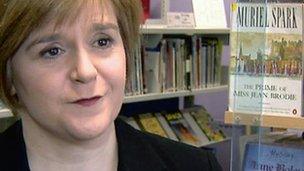Scottish independence: Giving the youth a say
- Published
Students at Linlithgow Academy on their impending responsibility in voting in Scotland's independence referendum
Diligent public servants that they are, Nicola Sturgeon's team surveyed the scene in advance of my interview with the deputy first minister today.
What, you could see them wondering, would be visible in the background?
Well, since we were in a school library, books were a reasonable bet. But which books? Wouldn't do, they reasoned, to have the DFM gazing boldly into the lens - with the word "fiction" emblazoned above her head.
In the event, any problem was pre-empted by myself and my esteemed colleague, Zoe MacDonald. Have a glance at the interview, online or on the telly, and discern our solution.
Hint: a novel with a strong connection with the venue, James Gillespie's High School in Edinburgh. Worked out the answer already? You are truly the crème de la crème.
As were the youngsters we encountered at Gillespie's. Bright, questioning, engaged - but also polite and discursive, rather than assertively argumentative.
Ditto, very much so, the pupils at Alex Salmond's old school, Linlithgow Academy, where we also sought views on the proposal to extend the franchise for the referendum to 16 and 17-year-olds.
At Linlithgow, as at Gillespie's, there was evident support for the measure. But we also discovered concerns, even among the affected age group.
Some wondered whether they had the experience, the information.
One or two fretted over a possible avenue for bullying: would the two sides in the referendum transform into yet another school division to be exploited by anti-social elements?
At Gillespie's, they questioned Nicola Sturgeon closely.
How would this work? In particular, one pupil pointed out that allowing 16-year-olds to vote means registering children who are even younger than that. How about child protection?
Good question - and even better in that it came from a teenager in this instance. The answer is that there will be a distinct register for young people, with sensitive information protected.
But will that work? Won't that information leak or be disclosed, perhaps inadvertently? Ms Sturgeon offered assurances - and stressed that these issues will be examined in committee at Holyrood, starting on Thursday.

James Gillespie's High School has a connection with a certain novel
That scrutiny will be conducted by the special committee whose convener is Bruce Crawford, the former minister.
As they will also examine the "Big Bill" (establishing the referendum itself), they have a huge responsibility.
But Ms Sturgeon - backed by other parties, with the exception of the Conservatives - is adamant that it is right to extend the franchise for this referendum (and, indeed, she would argue, for other elections - although that is not in prospect at the moment.)
She said that if 16-year-olds could marry, have children, join the armed forces and pay tax, then they were entitled to a say in their nation's future.
Other than the addition of 16 and 17-year-olds, the bill provides that the franchise for the referendum will be the same as for Holyrood elections.
That includes: British citizens resident in Scotland; qualifying Commonwealth citizens resident in Scotland; citizens of the Republic of Ireland and other EU countries, resident in Scotland; members of the House of Lords, resident in Scotland; and service/Crown personnel serving in the UK or overseas who are registered to vote in Scotland.
PS: All the best to the team at Gillespie's who are setting up a pupil newsletter. To be called The Spark, perhaps?